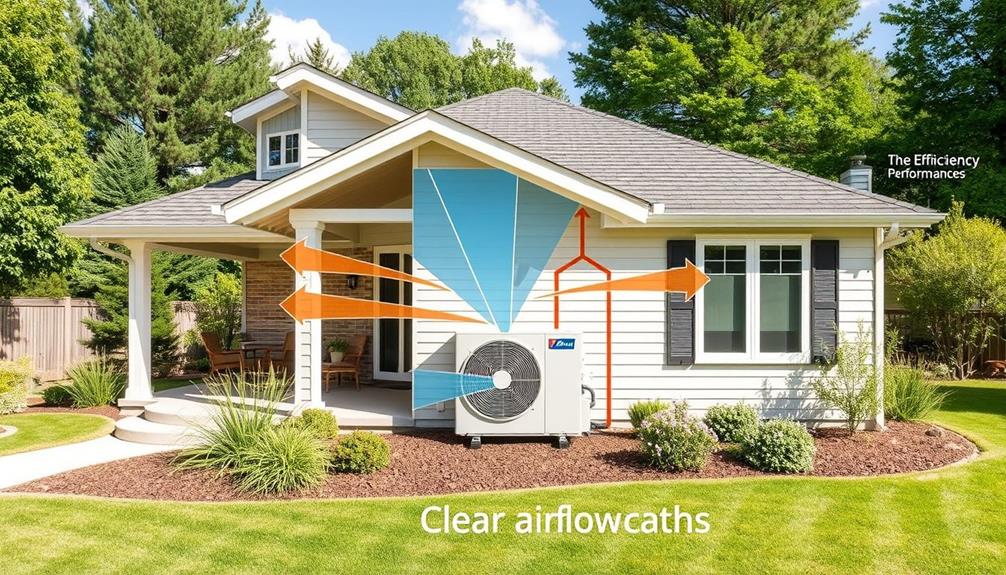We have the answer to your issues with the refrigeration cycle of the heat pump.
In this article, we’ll delve into the ins and outs of the cycle, identify common issues, and show you how to troubleshoot and fix them efficiently.
Whether you’re dealing with low refrigerant levels, compressor malfunctions, or evaporator coil freezing, we’ve got you covered.
We’ll even address condenser fan malfunctions and expansion valve failures.

Get ready to optimize your heat pump’s efficiency and keep serving others with confidence.
Key Takeaways
- The heat pump refrigeration cycle consists of four main components: evaporator, compressor, condenser, and expansion valve.
- Common problems in the refrigeration cycle include refrigerant leaks, inadequate cooling or heating, and compressor failure.
- Troubleshooting low refrigerant levels involves checking for visible leaks and performing a pressure test.
- Proper compressor maintenance is crucial for the efficient operation of the refrigeration cycle.
Understanding the Heat Pump Refrigeration Cycle
We’ll start by examining the basic components of the heat pump refrigeration cycle. Understanding the heat pump operation and the refrigeration cycle components is crucial in solving heat pump predicaments efficiently.
The heat pump refrigeration cycle consists of four main components: the evaporator, compressor, condenser, and expansion valve.
The evaporator is responsible for absorbing heat from the surroundings and evaporating the refrigerant.
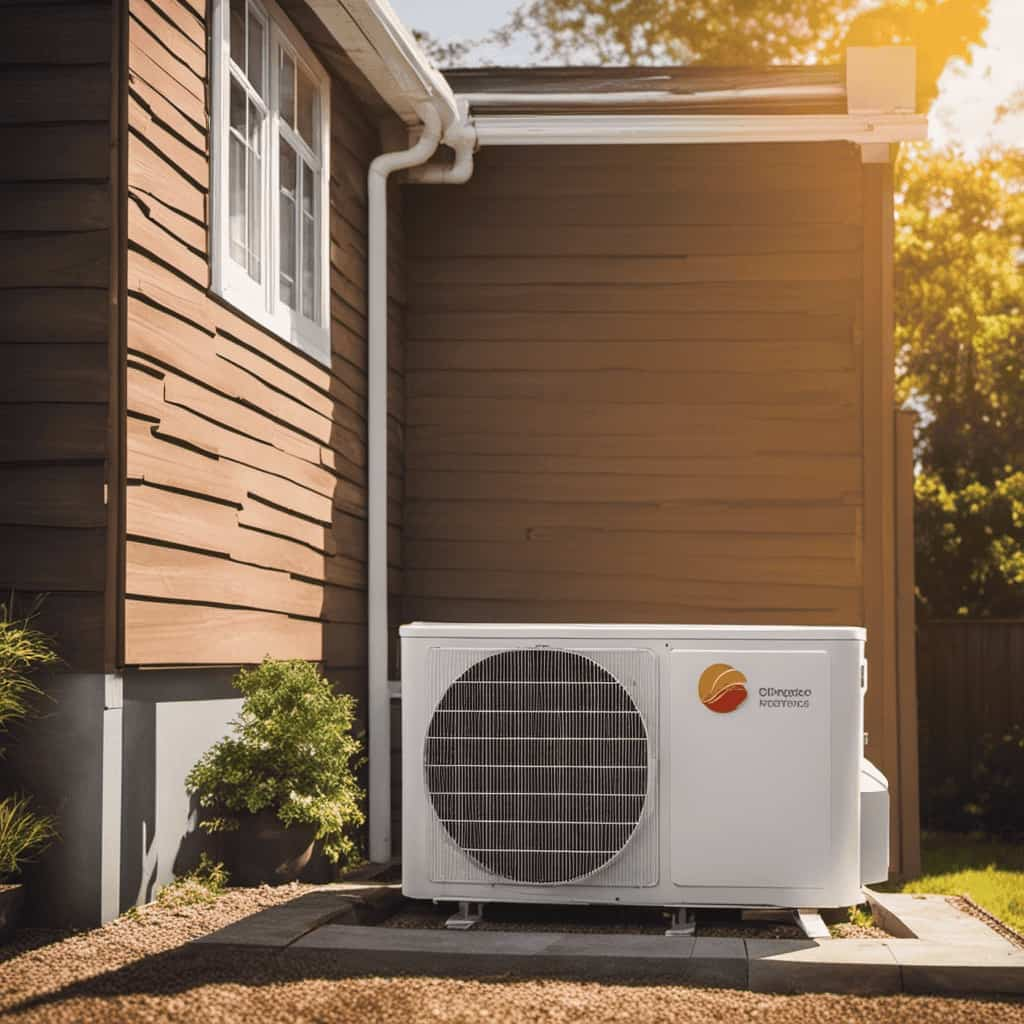
The compressor then increases the pressure and temperature of the refrigerant, pushing it into the condenser.
In the condenser, the refrigerant releases heat and condenses into a liquid state.
Finally, the expansion valve reduces the pressure of the refrigerant, allowing it to evaporate again in the evaporator.
Identifying Common Problems in the Refrigeration Cycle
There are three common problems that can occur in the refrigeration cycle: refrigerant leaks, inadequate cooling or heating, and compressor failure. Identifying refrigeration leaks is crucial in maintaining the efficiency of the system. Leaks can result in decreased cooling or heating performance and increased energy consumption. One way to identify leaks is through a refrigerant leak detector, which can detect the presence of refrigerant in the air. Another common issue in the refrigeration cycle is inadequate cooling or heating. This can be caused by various factors such as clogged air filters, low refrigerant levels, or faulty thermostat settings. Addressing refrigeration cycle pressure issues is also important. High or low pressure can indicate problems with the compressor, condenser, or expansion valve. Regular maintenance and troubleshooting can help to identify and resolve these common problems, ensuring optimal performance of the refrigeration cycle.
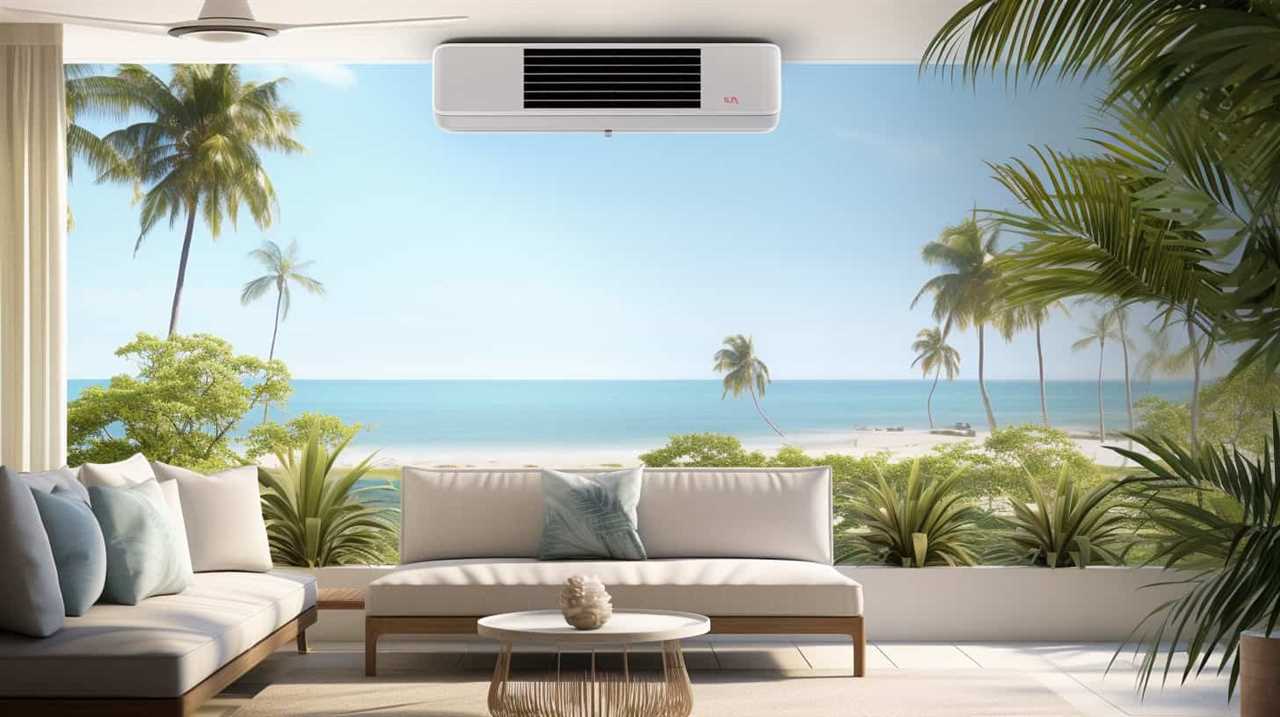
| Common Problems in the Refrigeration Cycle | ||
|---|---|---|
| Refrigerant Leaks | Inadequate Cooling or Heating | Compressor Failure |
| Decreased performance | Clogged air filters | Faulty compressor |
| Increased energy consumption | Low refrigerant levels | Faulty expansion valve |
| Reduced cooling or heating | Incorrect thermostat settings |
Troubleshooting Low Refrigerant Levels
To troubleshoot low refrigerant levels, we can check for any visible leaks and perform a pressure test to determine the exact cause of the issue. Troubleshooting refrigerant leaks involves inspecting the refrigeration system for signs of leakage, such as oil stains or hissing sounds. By identifying and repairing these leaks, we can prevent further refrigerant loss and ensure the system operates at optimal efficiency.
Additionally, diagnosing refrigerant restrictions requires a thorough examination of the system’s components, including the evaporator and condenser coils, expansion valve, and filter drier. By analyzing pressure and temperature differentials across these components, we can pinpoint any restrictions and take appropriate corrective measures.
It’s crucial to address low refrigerant levels promptly to avoid potential damage to the heat pump and to maintain a comfortable indoor environment for our customers.
Fixing Compressor Issues in the Refrigeration Cycle
Let’s address compressor issues in the refrigeration cycle by conducting a thorough inspection and performing necessary repairs to ensure optimal performance. Proper compressor maintenance is crucial for the efficient operation of the refrigeration cycle. Regular inspections should be carried out to identify any signs of wear and tear, leaks, or abnormal noises. If any issues are detected, prompt repairs should be made to prevent further damage and maintain the overall performance of the system. In some cases, compressor replacement may be necessary, especially if the compressor is old or irreparable. A well-maintained and properly functioning compressor is essential for the smooth operation of the refrigeration cycle, ensuring reliable cooling and efficient energy usage. By prioritizing compressor maintenance and addressing any issues promptly, we can provide our customers with the best service possible.

| Maintenance Tips | Signs of Compressor Issues | Repairs and Replacements |
|---|---|---|
| Regularly clean and inspect the compressor | Abnormal noises or vibrations | Promptly repair any leaks or damage |
| Check for refrigerant leaks | Inconsistent cooling performance | Replace compressor if irreparable |
| Monitor compressor temperature and pressure | Excessive energy consumption | Conduct regular inspections and maintenance |
| Lubricate moving parts as recommended | Overheating or frequent cycling | Schedule compressor replacement if necessary |
| Ensure proper electrical connections | High discharge pressure | Prioritize compressor maintenance for optimal performance |
Resolving Evaporator Coil Freezing Problems
One common predicament in heat pump refrigeration cycles is when the evaporator coil freezes, causing inefficiencies and potential system damage. Troubleshooting defrosting issues and preventing coil icing are crucial steps in maintaining the optimal performance of a heat pump. Here are three key factors to consider:
-
Insufficient airflow: Limited airflow across the evaporator coil can lead to ice accumulation. This can be caused by dirty air filters, blocked vents, or a malfunctioning blower motor. Regularly cleaning or replacing air filters and ensuring proper ventilation can help prevent coil icing.
-
Low refrigerant levels: Inadequate refrigerant charge can disrupt the heat transfer process, leading to freezing of the evaporator coil. Detecting and fixing any refrigerant leaks and ensuring the correct charge levels are maintained are essential for preventing coil icing.
-
Malfunctioning defrost control: A faulty defrost control mechanism can hinder the timely removal of ice from the evaporator coil. Regular inspection and maintenance of the defrost control system are necessary to ensure efficient defrost cycles and prevent coil icing.
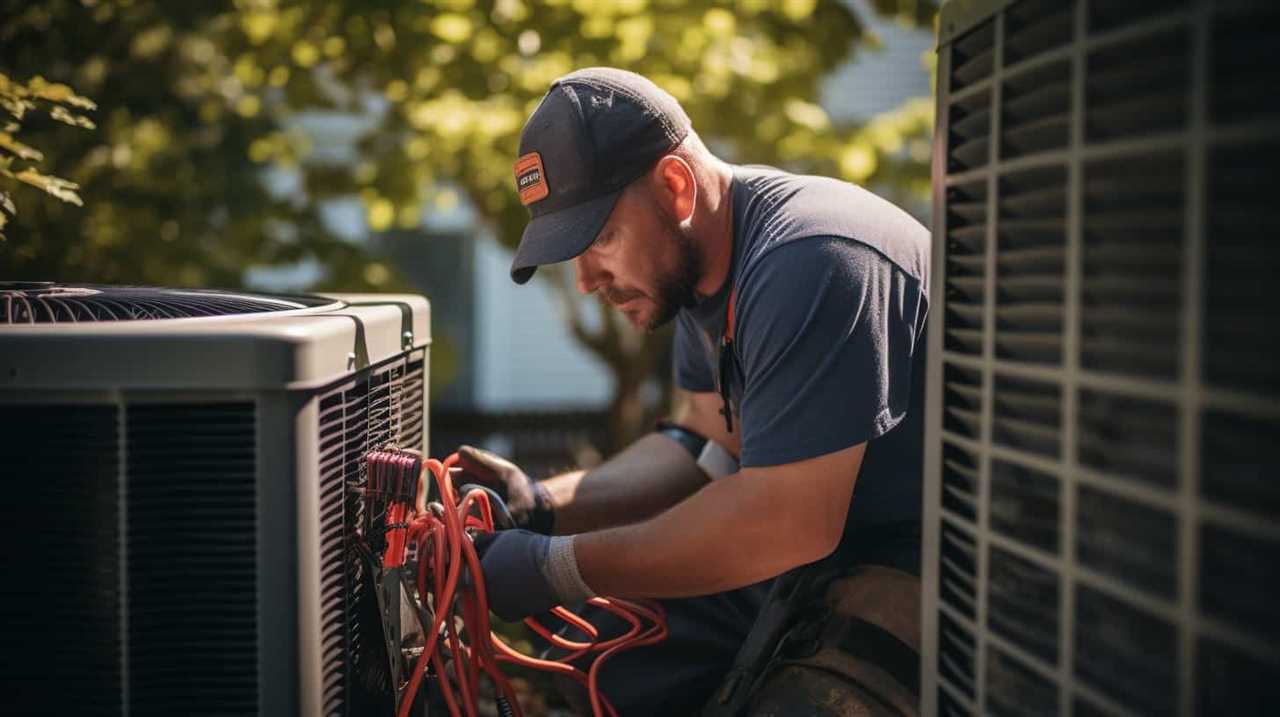
By addressing these troubleshooting measures, we can effectively resolve evaporator coil freezing problems and optimize the performance of the heat pump refrigeration cycle.
In the next section, we’ll discuss addressing condenser fan malfunctions to further enhance system efficiency.
Addressing Condenser Fan Malfunctions
We can effectively address condenser fan malfunctions by checking for debris and ensuring proper lubrication. Troubleshooting the fan motor and replacing fan blades are also important steps to consider. The condenser fan plays a crucial role in the heat pump refrigeration cycle, as it helps to dissipate heat from the system. When the fan malfunctions, it can lead to reduced efficiency, increased energy consumption, and potential damage to the compressor. To troubleshoot the fan motor, we need to check for any loose connections, test the voltage supply, and inspect the motor for any signs of damage. If the fan blades are damaged or worn out, they should be replaced promptly to ensure optimal performance. Regular maintenance and inspection of the condenser fan are essential to prevent malfunctions and maximize the efficiency of the heat pump system.
| Potential Issue | Troubleshooting Steps | Resolution |
|---|---|---|
| Debris | – Clean the fan blades and surrounding area |
- Remove any obstructions from the fan | Ensure proper airflow and prevent damage to the fan |
| Lack of lubrication | – Check the fan motor’s lubrication ports - Add lubricant as recommended by the manufacturer | Prevent motor overheating and reduce friction |
| Motor malfunction | – Inspect for loose connections - Test voltage supply
- Check for signs of damage | Repair or replace the faulty motor |
| Damaged fan blades | – Inspect for signs of wear or damage - Replace blades if necessary | Maintain optimal performance and airflow |
Dealing With Expansion Valve Failures
When it comes to dealing with expansion valve failures in a heat pump refrigeration cycle, there are three key points to consider.

First, understanding the causes of valve failure is crucial in order to effectively troubleshoot and address the issue.
Second, a thorough troubleshooting process for the expansion valve should be followed to identify any potential problems and determine the necessary repairs or replacements.
Causes of Valve Failure
The article discusses the causes of valve failure, specifically addressing the challenges involved in dealing with expansion valve failures in a heat pump refrigeration cycle. Understanding the causes of valve failure is crucial for efficient operation of heat pump systems.
Here are three key factors that contribute to expansion valve failures:

-
Insufficient lubrication: Lack of proper lubrication can lead to increased friction and wear on the valve components, causing them to malfunction or become stuck.
-
Contaminants in the refrigerant: Foreign particles, such as dirt, debris, or moisture, can enter the system and accumulate in the expansion valve, obstructing its operation and reducing its efficiency.
-
Improper valve maintenance: Neglecting regular valve maintenance, such as cleaning, inspection, and adjustment, can result in valve failure over time. It’s important to follow recommended valve maintenance tips to ensure optimal performance and longevity of the valve.
Understanding these causes and implementing proper maintenance practices can help mitigate the effects of valve failure, ensuring a reliable and efficient heat pump refrigeration cycle.

Troubleshooting Expansion Valve
To effectively troubleshoot expansion valve failures, we must identify the root cause and implement appropriate corrective measures. One common issue is a clogged expansion valve, which can be caused by debris or contaminants in the refrigerant system. In this case, the expansion valve should be cleaned or replaced.
Another potential problem is an improperly sized expansion valve, which can lead to poor refrigerant flow and inefficient system operation. In such cases, the expansion valve should be correctly sized to match the system requirements.
Additionally, issues with the superheat setting and refrigerant charge can also affect the performance of the expansion valve. By addressing these common troubleshooting techniques, we can effectively resolve expansion valve failures and ensure optimal system performance.
Transition: Now that we’ve covered troubleshooting techniques, let’s move on to preventing future failures.

Preventing Future Failures
To prevent future failures, we must regularly inspect and maintain the expansion valve in our heat pump refrigeration system. By implementing the following maintenance strategies, we can significantly reduce the risk of breakdowns and ensure optimal performance:
-
Routine Inspections: Regularly inspect the expansion valve for any signs of wear, such as leaks, debris buildup, or corrosion. This will allow us to identify and address any potential issues before they escalate.
-
Cleaning and Lubrication: Clean the expansion valve thoroughly to remove any accumulated dirt or debris. Additionally, lubricate the moving parts to minimize friction and ensure smooth operation.
-
Calibration: Periodically calibrate the expansion valve to ensure proper functioning and consistent refrigerant flow. This will help maintain the desired temperature levels and prevent any disruptions in the refrigeration cycle.

By following these maintenance strategies, we can prevent future breakdowns and ensure the longevity of our heat pump refrigeration system.
Now, let’s explore how we can further optimize its efficiency in the refrigeration cycle.
Optimizing Heat Pump Efficiency in the Refrigeration Cycle
Since optimizing heat pump efficiency is crucial in the refrigeration cycle, we must consider various strategies to achieve maximum energy savings.
Maximizing efficiency and improving performance are key goals in heat pump operation. One strategy is to ensure proper system sizing, as an undersized or oversized system can lead to decreased efficiency.

It’s also important to properly insulate the system and minimize heat losses, as this can significantly impact the overall efficiency. Regular maintenance and cleaning of the heat pump components, such as the evaporator and condenser coils, is essential to maintain optimal performance.
Additionally, the use of advanced control systems, such as variable speed drives and intelligent controls, can help optimize heat pump efficiency by adjusting the system’s operation based on the current load requirements.
Frequently Asked Questions
How Can I Determine if My Heat Pump Refrigeration Cycle Is Functioning Efficiently?
Regular maintenance is crucial for ensuring efficient heat pump refrigeration cycles. By monitoring performance and addressing common causes of inefficiency, we can optimize the system’s operation and maximize its energy efficiency, resulting in cost savings and environmental benefits.
What Are Some Signs That Indicate Low Refrigerant Levels in a Heat Pump Refrigeration Cycle?
Warning signs of low refrigerant levels in a heat pump refrigeration cycle include inadequate cooling or heating, increased energy consumption, and hissing or bubbling sounds. Troubleshooting techniques involve checking pressure gauges and inspecting for leaks.
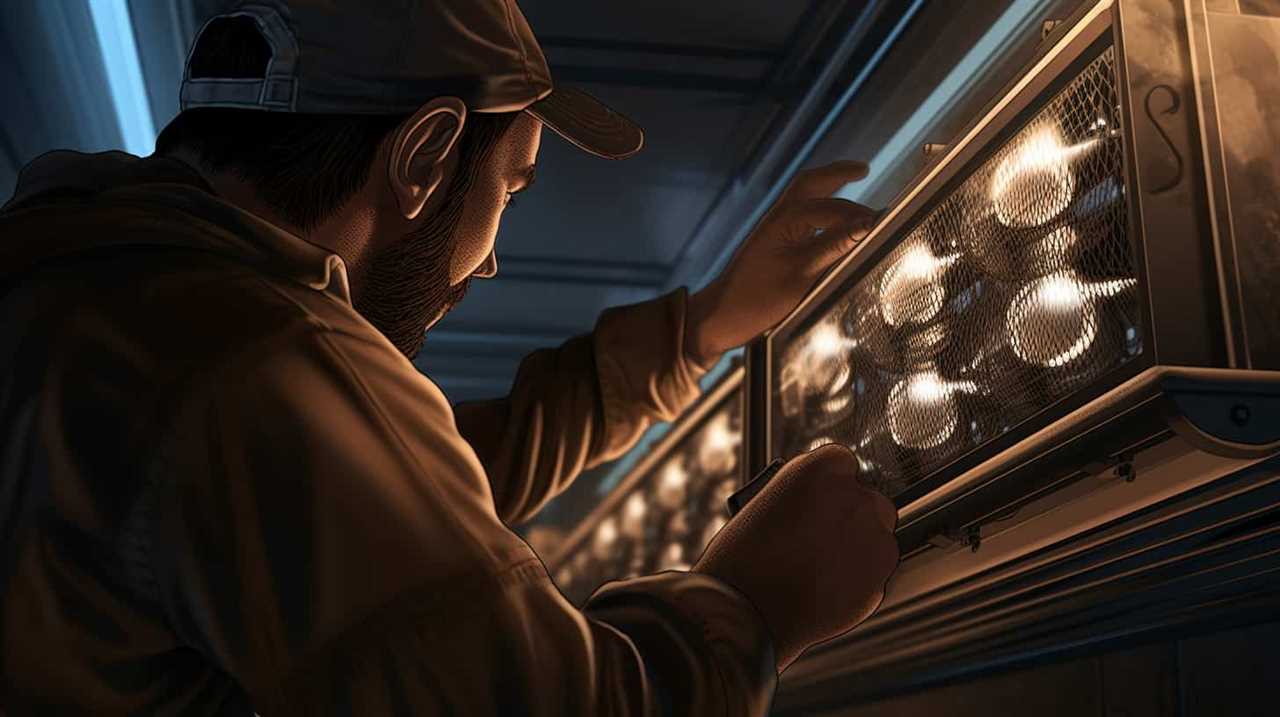
Is It Possible to Fix Compressor Issues in the Refrigeration Cycle Without Professional Help?
Yes, it is possible to fix compressor issues in the refrigeration cycle without professional help. By using self-diagnosing techniques and troubleshooting methods, we can identify and address common problems, such as faulty valves or motor issues.
How Can I Prevent Evaporator Coil Freezing Problems in My Heat Pump Refrigeration Cycle?
To prevent evaporator coil freezing problems in our heat pump refrigeration cycle, we troubleshoot refrigerant leaks and ensure proper airflow. Regular maintenance and cleaning of the coil are essential in preventing coil icing and optimizing heat pump performance.
Are There Any Maintenance Tasks I Can Perform to Optimize the Efficiency of My Heat Pump Refrigeration Cycle?
To optimize the efficiency of our heat pump refrigeration cycle, we can perform various maintenance tasks and use energy-saving techniques. These include regular cleaning of coils, checking and replacing filters, and ensuring proper insulation.
Conclusion
In conclusion, efficiently solving heat pump refrigeration cycle predicaments requires a thorough understanding of the system and the ability to troubleshoot common problems.
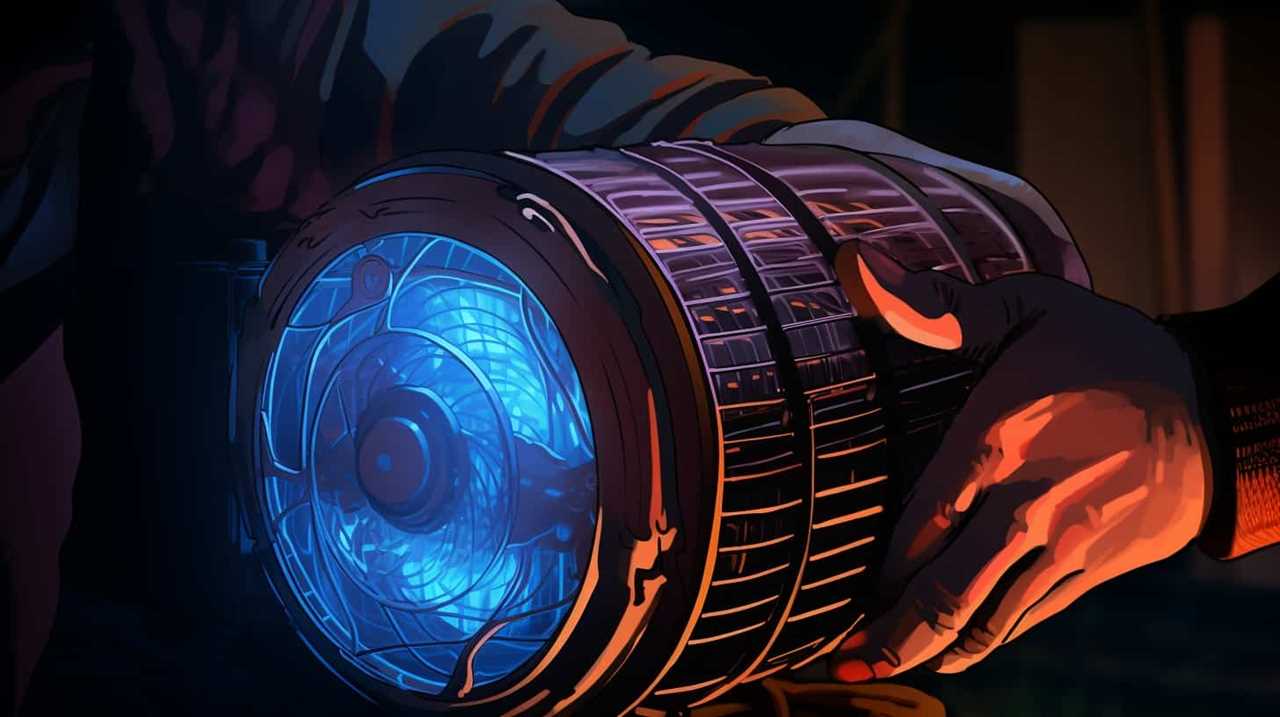
By addressing issues such as low refrigerant levels, compressor problems, evaporator coil freezing, condenser fan malfunctions, and expansion valve failures, the efficiency of the heat pump can be optimized.
Just like a skilled surgeon delicately repairing a damaged organ, resolving these issues brings the refrigeration cycle back to its peak performance.









